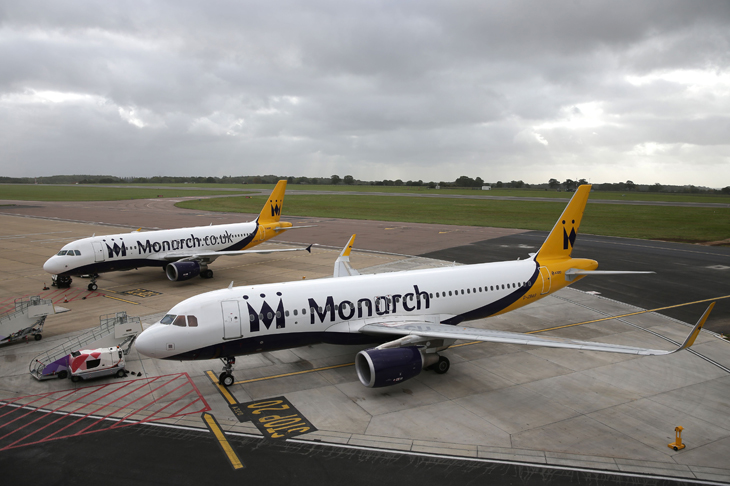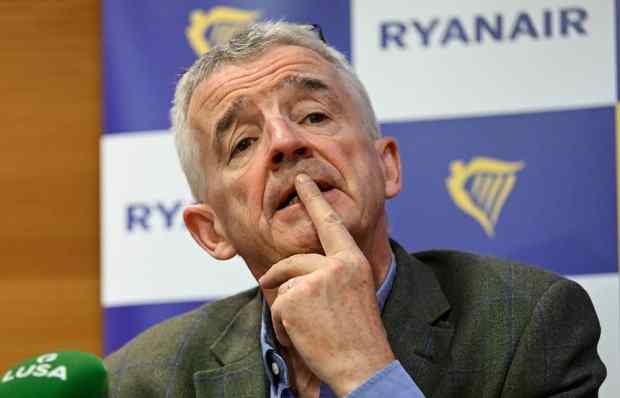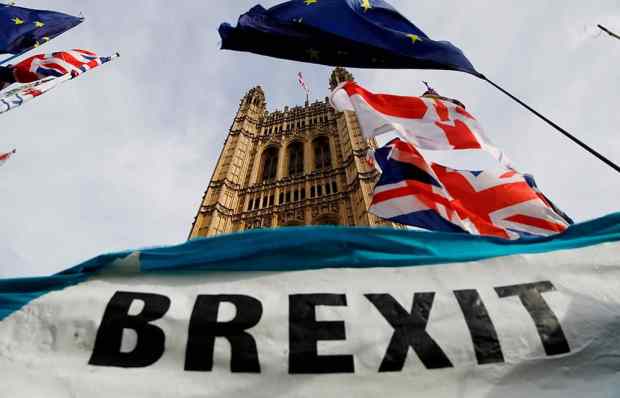Monarch Airlines was the ghost of an earlier age of holiday travel. When I used to see its planes lined up at Leeds-Bradford airport alongside those of Ryanair and its brash northern rival Jet2, I sometimes wondered why Monarch was still there. Now it has been brought down by a combination of the weak pound, too much competition on Iberian routes and too little demand for terrorist-threatened ones to Turkey, Tunisia and Egypt. Even the orderly repatriation of 110,000 Monarch passengers has had an old-fashioned feel to it (perhaps even a touch of Dunkirk, for those who have seen that excellent film), enhanced by the reassuring tones of Dame Deirdre Hutton, the veteran quango queen who chairs the Civil Aviation Authority.
Monarch’s demise reflects changing European aviation markets — in which two other carriers, Alitalia and Air Berlin, have gone bust this year — but I’m wondering how much it also has to do with changed ownership. The billionaire Swiss-Italian Mantegazza family who created Monarch in 1967 had evidently tired of injecting capital to modernise its fleet and become nervous of its £660 million pension fund shortfall. They sold it in 2014 to Greybull Capital, a Sloane Street-based private equity firm run by two French brothers, Marc and Nathaniel Meyohas, and a Swede, Richard Perlhagen, who invest their own families’ money.
Monarch staff took 30 per cent pay cuts and pilots had their pension rights slashed when the company scheme was transferred to the government’s Pension Protection Fund. But Greybull stepped up with an extra £165 million to renew the airline’s operating licence last year and is now thought to be in the hole for £250 million. Marc Meyohas has said that Greybull has ‘some expertise in turnaround and helping firms through choppy waters’. But how much? Another of its investments (among a portfolio of a dozen or so) was the My Local chain of convenience stores, spun out of Morrisons, which collapsed last year; a third, Rileys Sports Bars, has staggered from crisis to crisis. Meanwhile, Greybull’s purchase for £1 of Tata Steel’s ‘long products’ division in Scunthorpe garnered good headlines and saved 4,000 jobs, but is the firm’s riskiest punt of all. How does this small team of high-rolling financiers have the time and knowledge to manage such demanding businesses across such diverse sectors? It’s a question 2,000 redundant Monarch employees will certainly be asking.
Labour’s threat to the Bank
Another ghost appeared last week. Gordon Brown popped up at a Bank of England conference marking 20 years since he granted its independence in interest-rate setting in one of the first acts of his chancellorship — shortly before he took away its role in banking supervision. Gracious as ever, he took the opportunity to bash former governor Mervyn King for the Bank’s perceived failure to cut rates more aggressively ahead of the 2008 financial crisis, while praising his own forbearance to interfere.
Brown’s comeback followed shadow chancellor John McDonnell’s party conference speech threatening to drag the Bank’s governor into a politically driven ‘strategic investment board’ to co-ordinate ‘promotion of investment, employment and real wages’. Together, they reminded us that the breed of politicians whose real motivation is the exercise of power above all else will never be entirely reconciled to central-bank independence — and that central bankers need to stay on their toes accordingly.
Recent remarks from both Mark Carney and his deputy Sir Jon Cunliffe have emphasised the growing risk of another debt crisis; wiser commentators than me have questioned the wisdom of maintaining inflation-targeting as the core purpose of rate setting, and the efficacy of interest rates as a policy tool at all after years of disuse. It would be hard to argue that the Bank of England looks more self-confident and better at its job today than it did in 2007, or is more valued and admired by the public. In the anti-capitalist mood that might well sweep Labour to power next time round, the Bank’s independence could be snatched away as abruptly as it was once granted.
The last Rickogram
Sir Richard Greenbury, the former Marks & Spencer chairman who died last week aged 81, was one of those choleric but thin-skinned corporate chiefs (Sir Alastair Morton of Eurotunnel was another) who never learned to handle journalists. The Telegraph reporter Kate Rankine famously caused him to blow his top at a 1997 press conference by asking when he intended to retire; he made matters worse by describing her later as ‘a silly little girl’. Editors who criticised the retail chain’s performance and his own perceived failure to reinvigorate it received blazing letters known as ‘Rickograms’, of which one to the female editor of Investors Chronicle began: ‘Dear Sir, What a load of old tosh…’
A suitably blunt answer to the retirement question finally came in 1999, when Greenbury was forced out after an undignified boardroom tussle and a farewell salvo from his City-page antagonists. Undoubtedly he clung to power too long and let his ego get in the way — but still we can salute his career-long loyalty to M&S and its founders’ precepts of high staff welfare, long-term supplier relationships, and attention to quality that created both a trusted brand and a share worth owning. As I’ve said before, that benign model is worth recalling whenever capitalism’s critics are on the rampage.
As for Sir Rick, his epistolary style mellowed in old age. His last letter to me, in May, was on the subject of executive pay, on which he took another media kicking when he chaired a CBI enquiry in 1995 and which he strongly believed should be restrained by institutional shareholders rather than government intervention. It ended ‘Warmest good wishes, no reply needed’, to which I replied ‘Do keep writing’. I’m sorry I won’t be hearing from him again.
Got something to add? Join the discussion and comment below.
Get 10 issues for just $10
Subscribe to The Spectator Australia today for the next 10 magazine issues, plus full online access, for just $10.
You might disagree with half of it, but you’ll enjoy reading all of it. Try your first month for free, then just $2 a week for the remainder of your first year.















Comments
Don't miss out
Join the conversation with other Spectator Australia readers. Subscribe to leave a comment.
SUBSCRIBEAlready a subscriber? Log in